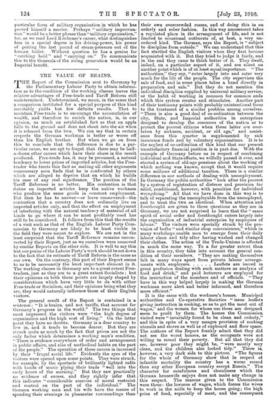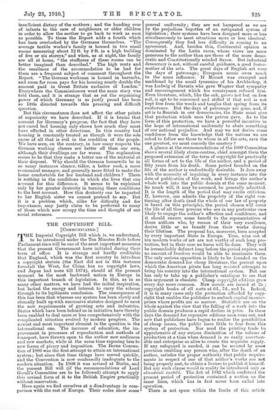THE VALUE OF BRAINS. T HE Report of the Commission sent
to Germany by the Parliamentary Labour Party to obtain informa- tion as to the condition of the working classes leaves the relative advantages of Free-trade and Tariff Reform still undetermined. Undetermined, we mean, in the sense that a comparison instituted for a special purpose of this kind inevitably yields but few definite results. That to maintain Free-trade is to encourage the accumulation of wealth, and therefore to enrich the nation, is, in our opinion, as much an established fact as that an apple falls to the ground and does not shoot into the air when it is released from the tree. We can say that in certain respects the German workman is better or worse off than his English brother. But when we go on from this to conclude that the difference is due to a par- ticular cause, we are apt to forget that there may be half- a-dozen other causes which have their share in the result produced. Free-trade has, it may be presumed, a natural tendency to lower prices of imported articles, but the Free- trader who treats this fact as making all other arguments unnecessary soon finds that he is confronted by others which are alleged to deprive that on which he builds his case of any real significance. The position of the Tariff Reformer is no better. His contention is that duties on imported articles keep the native workmen who produce the same goods in constant employment. But then he has to answer—or leave unanswered—the contention that a country does not ordinarily live on imported articles only, and that the effect on employment of interfering with the natural tendency of material of all kinds to go where it can be most profitably used has still to be considered. It follows from this that the results of a visit such as that of the English Labour Party Com- mission to Germany are likely to be least visible in the field they were meant to explore. We are not in the least surprised that the Tariff Reformer remains uncon- verted by their Report, just as we ourselves were unmoved by similar Reports on the other side. It is well to say this lest our praise of the Labour Party's work should be set down to the fact that its estimate of Tariff Reform is the same as our own. On the contrary, this part of their Report seems to us to be necessarily the least important element in it. The working classes in Germany are to a great extent Free- traders, just as they are to a great extent Socialists ; but their opinions on both these points are largely shaped by considerations which have very little to do with either Free-trade or Socialism, and their opinions being what they are, they would naturally influence those of their English visitors.
The general result of the Report is contained in a sentence : " It is brains, and not tariffs, that account for Germany's progress in the world." The two things that most impressed the visitors were " the high degree of organisation and the high cost of living." On the latter point they have no doubts. Germany is a dear country to live in, and it tends to become dearer. But they are struck quite as much by the fact that prices are not the only factor which determines a working man's condition. " There is evidence everywhere of order and arrangement in public affairs, and also of methodical habits on the part of the people." The operation of these causes is increased by their " frugal social life." Evidently the eyes of the visitors were opened upon some points. They were struck, for example, by the spectacle of brilliantly lighted cafes with bands of music plying their trade " well into the early hours of the morning." But they saw practically no evidence of excess, and they rightly infer that this indicates " considerable exercise of moral restraint and control on the part of the individual." The German working man and his wife have the means of spending their evenings in pleasanter surroundings than their own overcrowded rooms, and of doing this in an orderly and sober fashion. In this way amusement takes a regulated place in the arrangement of life, and is not limited to occasional outbursts of, at best, a very un- ordered kind. The German, says the Report, is " subject to discipline from outside." We can understand that this fact startled the English visitors when they first became acquainted with it. But they tried to judge it fairly, and in the end they came to think better of it. They dwell, indeed, on a particular aspect of it, and are silent on another point which is of at least equal importance. " The authorities," they say, " enter largely into and cater very much for the life of the people. The city supervises the sale of food, and in some places takes a hand directly in preparation and sale." But they do not mention the individual discipline supplied by universal military service, or the habit of working in common for common ends which this system creates and stimulates. Another part of their testimony points with probably unintentional force to the treatment of a similar problem among ourselves. " There is also a good deal of co-ordination between the city, State, and Imperial authorities in enterprises designed to develop the resources of the nation or to protect the poorest citizens when these latter are over- taken by sickness, accident, or old age," and assist- ance from this quarter is supplemented by sick insurance funds and by voluntary organisations. It is to the neglect of co-ordination of this kind that our present unsatisfactory financial position is in part due. With the example of Germany before us in respect of combining individual and State efforts, we wilfully passed it over, and started a system of old-age pensions about the working of which nothing was known, except that it would require some millions of additional taxation. There is a similar difference in our methods of dealing with unemployment. In Germany the public authorities " look after the poorest by a system of registration of distress and provision for relief, conditioned, however, with penalties for individual wrongdoing." All that we have done in this way is to talk of separating the unemployable from the unemployed, and to treat the two as identical. When attention and forethought are given to these questions as they are in Germany, we are not surprised to learn that the " same spirit of social order and forethought enters largely into the organisation of industrial enterprise by employers of labour." The visitors were specially struck by the pro- vision of baths " and similar shop conveniences," which in many workshops enable men to emerge from their daily labour clean and tidy after having washed and changed their clothes. The action of the Trade-Unions is affected. in much the same way. To a far greater extent than in this country, they take into account the general con- dition of their members. " They are making themselves felt in many ways apart from private labour arrange- ments with employers Leaflets are issued in great profusion dealing with such matters as analysis of food and drink," and paid lecturers are employed for the instruction of the members and of officials. " They have in this way helped largely in making the German workman more alert and better informed, and therefore more efficient."
It is the same with the workmen's homes. Municipal authorities and Co-operative Societies " issue leaflets giving instruction in cooking, so as to get the most out of wages," and the women for whose use these are designed seem to profit by them. The homes the Commission visited were " invariably found to be clean and orderly," and this in spite of a very meagre provision of cooking utensils and stoves as well as of cupboard and floor space. The authors of the Report frankly admit that they did not see the worst houses, as the occupants were not willing to reveal their poverty. But all that they did see, however poor they might be, " were mostly very clean, and the children also looked tidy." There is, however, a very dark side to this picture. " The figures for the whole of Germany show that in respect of infantile mortality the country has a worse record than any other European country except Russia." The character for carefulness and cleanliness which the German housewife enjoys does not make any change in this respect. The reasons given to the Commission were three : the lowness of wages, which forces the wives to work in the mills to keep the house going; the high price of food, especially of meat, and the consequent insufficient dietary of the mothers ; and the handing over of infants to the care of neighbours or older children in order to allow the mother to go back to work as soon as possible. To these the Report adds a fourth which has been overlooked by the Germans themselves. "The average textile worker's family is housed in two small rooms measuring about 12 ft. by 9 ft. in a high building of five or six storeys," and when, as at night, the family are all at home, " the stuffiness of these rooms can be better imagined than described." The high rents and the smallness of the accommodation to be had for them are a frequent subject of comment throughout the Report. "The German workman is housed in barracks, and room for room pays for his housing nearly double the amount paid in Great Britain exclusive of London." Everywhere the Commissioners went the same story was told them, and it is strange that as yet the organising power of which Germany is so justly proud has been so little directed towards this pressing and difficult question.
But this circumstance does not affect the other points of superiority we have described. If it is brains that account for Germany's progress, the fact that they have not cured bad housing only shows how much they must have effected in other directions. In this country bad housing is constantly treated as though it were the sole cause of all that is evil in the condition of the people. We have seen, on the contrary, in how many respects the German working classes are better off than our own, although their dwellings are far worse. The explanation seems to be that they make a better use of the material at their disposal. Why should the German housewife be in so many instances cleaner, tidier, a better cook, a more economical manager, and generally more fitted to make the home comfortable for her husband and children ? There is nothing in the conditions in which she lives that can account for this difference. It seems to be explained only by her greater dexterity in turning these conditions to the best account. How this dexterity can be imparted to her English sister we cannot pretend to say. But it is a problem which, alike for difficulty and for importance, may justly claim to be preferred to many of those which now occupy the time and thought of our social reformers.







































 Previous page
Previous page